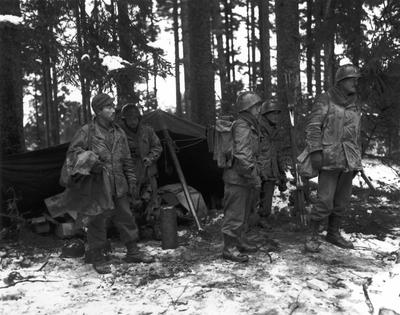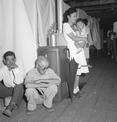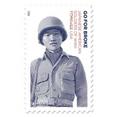Japanese American soldiers in World War II fought the Axis abroad and racial prejudice at home
Published in Political News
Imagine being forced from your home by the government, being imprisoned in a detention camp under armed guards and behind barbed wire – and then being required to join the military to fight for the nation that had locked up you and your family.
That’s what happened in a little-known chapter of U.S. history, in which many of those men went on to become American military heroes, some making the ultimate sacrifice. These soldiers, along with all other Japanese Americans who served in the U.S. armed forces during World War II, were honored with a new U.S. Postal Service stamp on June 3, 2021.
From the time the first immigrants had arrived from Japan in the 1880s, people of Japanese ancestry in the U.S. – whether they were American citizens or not – faced decades of discrimination. The inequities stemmed from politicians promoting anti-immigrant sentiments, workers and businesses fearing economic competition, and tensions relating to Japan’s rise as a military power. The attack on Pearl Harbor whipped those prejudices into a frenzy of fear that swept the nation. After Dec. 7, 1941, anyone with a Japanese face, especially on the West Coast, had the face of the enemy.
A little more than two months later, on Feb. 19, 1942, President Franklin D. Roosevelt issued Executive Order 9066, authorizing the forcible removal of about 120,000 people of Japanese ancestry from California, Oregon, Washington and parts of Arizona. Without any evidence of disloyalty or charges brought against them, these people – including my grandparents, parents and their families – were sent at gunpoint to hastily constructed detention facilities in desolate inland locations, where they spent the duration of the war.
Two-thirds of those incarcerated were “Nisei” – American citizens, born in the U.S. to Japanese immigrant parents. Their first-generation parents, called “Issei,” were barred by federal law from becoming citizens. Lacking any political clout or any effective allies, the community was powerless to fight against removal and imprisonment.
My forthcoming book, “When Can We Go Back to America? Voices of Japanese American Incarceration during World War II,” chronicles the stories of many who experienced this travesty of justice simply because of their race. I also tell of the roughly 33,000 Japanese Americans who served gallantly in the U.S. military during the war, fighting for a country that had unconstitutionally wronged them, their families and friends.
On Jan. 5, 1942, the War Department reclassified Japanese American men from being draft-eligible to “enemy aliens” not eligible for the draft. Yet as the war continued into 1943, the U.S. government put out a call seeking Japanese American volunteers to join the army. Thousands of them rushed to sign up, agreeing to serve in a segregated all-Nisei unit under the command of white officers.
Most of these volunteers were from Hawaii, where the Japanese American population had generally been allowed to stay in their homes. Future U.S. Sen. Daniel K. Inouye, then a college student, was among the first to enlist.
On the mainland, about 1,500 Nisei men volunteered from the 10 euphemistically named “relocation centers.” Of these, 805 were accepted into service, having satisfied a loyalty test administered only to incarcerated Nisei. Some used their Japanese language skills in the Military Intelligence Service in the Pacific theater, while others formed the 100th Infantry Battalion, which fought in Europe, including as a unit attached to the Nisei-staffed 442nd Regimental Combat Team.
By the end of 1943, U.S. military leaders had grimly realized they were running short of manpower. The political decision to reclassify the Nisei as ineligible for the draft was being reconsidered, as commanders were hearing impressive reports of Nisei volunteers in their training. Mike Masaoka of the Japanese American Citizens League was also lobbying the military brass for the opportunity to show through a “demonstration in blood” that Japanese Americans were loyal Americans.
...continued

















Comments